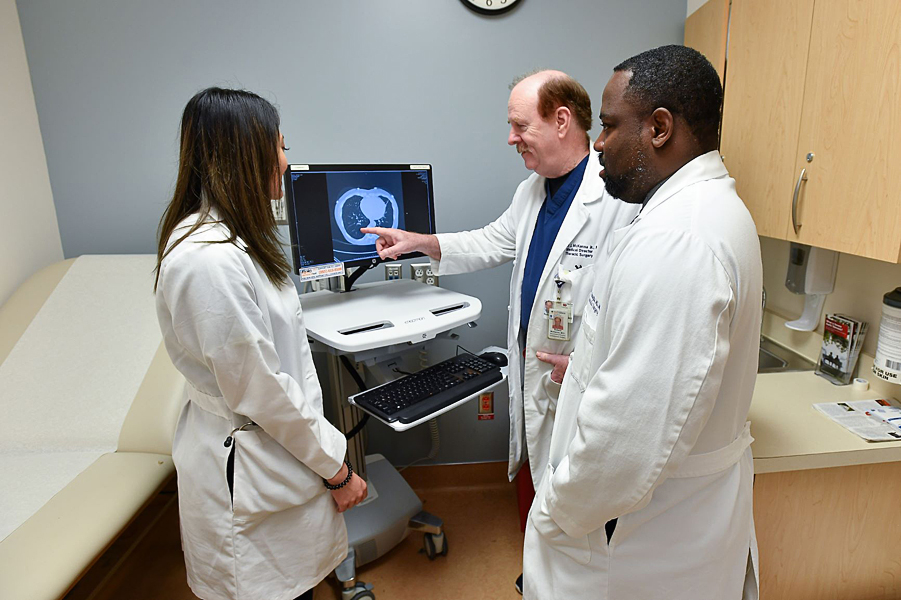
Did you know the lifetime risk of developing lung cancer is 1 in 15 for men and 1 in 17 for women? According to the American Cancer society, each year, more people die of lung cancer than of colon, breast, and prostate cancers combined. So what can we do to better educate ourselves and loved ones about the risk factors, prevention, and treatment options of lung cancer? We asked our expert, Dr. Robert McKenna, Jr., MD, internationally renowned thoracic surgeon, professor of surgery, and director of the Minimally Invasive Chest Surgery and Thoracic Surgical Oncology center at the Saint John’s Cancer Institute.
Who Can Get Lung Cancer?
A big misconception is that only smokers can get lung cancer, but smoking is one of the major risk factors associated with lung cancer. You can also develop lung cancer from breathing second hand smoke or from exposure to cancer-causing substances such as:
- Radon, which naturally occurs outdoors in harmless amounts, but sometimes becomes concentrated in homes built on soil with natural uranium deposits.
- Asbestos
- Chromium
- Nickel
- Radioactive ores, such as uranium and plutonium
- Arsenic
- Vinyl chloride
- Silica
- Coal products
- Mustard gas
- Chloromethyl ethers
- Diesel exhaust
- Soot
- Tar
Other Major Risk Factors:
A family history of lung cancer: You have a higher risk of developing lung cancer if a family member also had lung cancer.
History of radiation therapy to the chest: If you are a cancer survivor, there is a risk that you can develop another lung cancer due to having radiation therapy in the past. We have now operated on 53 women who developed lung cancer after radiation treatment for breast cancer. Patients with a history of radiation to the chest should consider screening chest CT scans.
Air pollution: Both indoor and outdoor air pollutants can contribute to lung cancer. The World Health Organization (WHO) classifies outdoor air pollution as a carcinogen. On an average day in Beijing, the SMOB is 20 times the safe limits for SMOG levels. Some estimate this will increase the rate of new lung cancers in China to 800,000 cases per year.
How Can I Prevent Lung Cancer?
Avoid or quit smoking: You can reduce your risk of developing lung cancer by avoiding or quitting smoking. Quitting at any age can significantly reduce your risk. Smoking, along with second hand smoke, has been linked to not only destroying your lung tissue, but can lead to a variety of ongoing complications in your body.
Test your home for radon: Other prevention methods are to test your home for radon. You can buy test kits at home improvement stores or call the National Radon Hotline for support at 1-800-SOS-RADON (1-800-767-7236).
Follow career safety guidelines: Be sure to follow health and safety guidelines at jobs which expose you to toxic chemicals.
Healthy diet: Eating a healthy diet full of fruits and vegetables is also beneficial to your health. According to the American Lung Associates, there is some evidence that eating a plant-based diet high in fruits and vegetables, can lower your risk of developing lung cancer but more research needs to be done.
Avoid e-cigarettes: Researchers have found that even with the use of e-cigarettes, you’re still getting nicotine into your lungs and bloodstream.
The best prevention is to make healthy lifestyle choices and schedule a lung cancer screening if you are at risk.
How Do I Get Screened for Lung Cancer?
Whether you are an active smoker or quit years ago, undergoing a lung cancer screening can aid in the early detection of lung cancer, when it is most treatable and offers the greatest chance of survival. At Providence Saint John’s Health Center we offer a low-dose CT scan that is designed to look for signs of lung cancer even before symptoms are present. A low-dose CT scan has a lower amount of radiation exposure and is a fast and effective way to scan your lungs.
Click here to learn more about lung cancer screening facts.
Providence also offers lung cancer screening at multiple locations.
View lung cancer screening locations
What Are My Treatment Options If I Have Lung Cancer?
Treatment is determined by the type and stage of lung cancer. Treatment may be surgery, chemotherapy, radiation therapy, immunotherapy, targeted drug therapy, or a combination of treatments.
Click here to learn more about lung cancer treatment options.
Unfortunately, lung cancer doesn’t usually cause symptoms until the cancer has spread, which makes it difficult to treat. That’s why it’s important to protect your health and get screened if you’re at risk. Schedule an appointment with our thoracic care team at our center of Minimally Invasive Chest Surgery and Thoracic Surgical Oncology to learn more about lung cancer.

